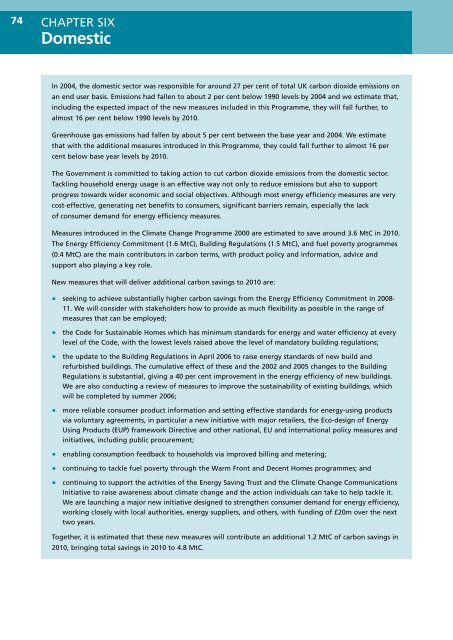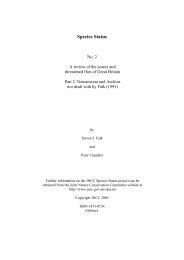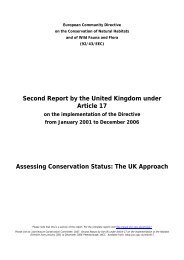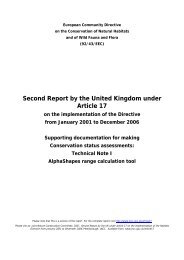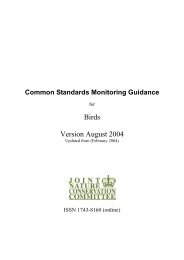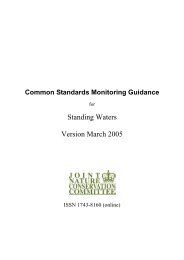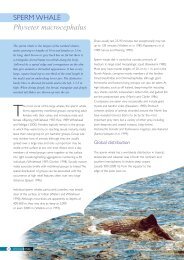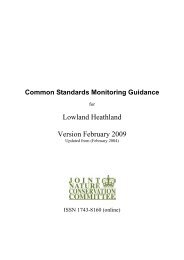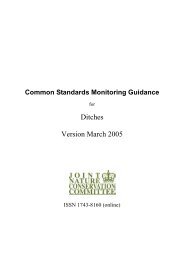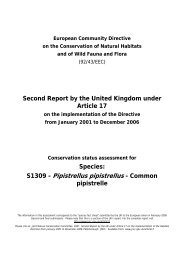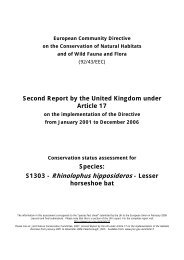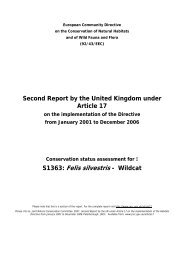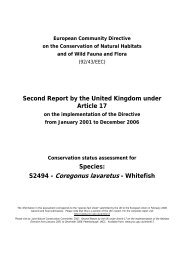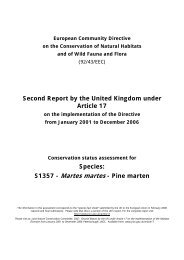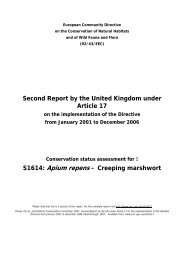UK Climate Change Programme 2006 - JNCC - Defra
UK Climate Change Programme 2006 - JNCC - Defra
UK Climate Change Programme 2006 - JNCC - Defra
Create successful ePaper yourself
Turn your PDF publications into a flip-book with our unique Google optimized e-Paper software.
74<br />
CHAPTER SIX<br />
Domestic<br />
In 2004, the domestic sector was responsible for around 27 per cent of total <strong>UK</strong> carbon dioxide emissions on<br />
an end user basis. Emissions had fallen to about 2 per cent below 1990 levels by 2004 and we estimate that,<br />
including the expected impact of the new measures included in this <strong>Programme</strong>, they will fall further, to<br />
almost 16 per cent below 1990 levels by 2010.<br />
Greenhouse gas emissions had fallen by about 5 per cent between the base year and 2004. We estimate<br />
that with the additional measures introduced in this <strong>Programme</strong>, they could fall further to almost 16 per<br />
cent below base year levels by 2010.<br />
The Government is committed to taking action to cut carbon dioxide emissions from the domestic sector.<br />
Tackling household energy usage is an effective way not only to reduce emissions but also to support<br />
progress towards wider economic and social objectives. Although most energy efficiency measures are very<br />
cost-effective, generating net benefits to consumers, significant barriers remain, especially the lack<br />
of consumer demand for energy efficiency measures.<br />
Measures introduced in the <strong>Climate</strong> <strong>Change</strong> <strong>Programme</strong> 2000 are estimated to save around 3.6 MtC in 2010.<br />
The Energy Efficiency Commitment (1.6 MtC), Building Regulations (1.5 MtC), and fuel poverty programmes<br />
(0.4 MtC) are the main contributors in carbon terms, with product policy and information, advice and<br />
support also playing a key role.<br />
New measures that will deliver additional carbon savings to 2010 are:<br />
• seeking to achieve substantially higher carbon savings from the Energy Efficiency Commitment in 2008-<br />
11. We will consider with stakeholders how to provide as much flexibility as possible in the range of<br />
measures that can be employed;<br />
• the Code for Sustainable Homes which has minimum standards for energy and water efficiency at every<br />
level of the Code, with the lowest levels raised above the level of mandatory building regulations;<br />
• the update to the Building Regulations in April <strong>2006</strong> to raise energy standards of new build and<br />
refurbished buildings. The cumulative effect of these and the 2002 and 2005 changes to the Building<br />
Regulations is substantial, giving a 40 per cent improvement in the energy efficiency of new buildings.<br />
We are also conducting a review of measures to improve the sustainability of existing buildings, which<br />
will be completed by summer <strong>2006</strong>;<br />
• more reliable consumer product information and setting effective standards for energy-using products<br />
via voluntary agreements, in particular a new initiative with major retailers, the Eco-design of Energy<br />
Using Products (EUP) framework Directive and other national, EU and international policy measures and<br />
initiatives, including public procurement;<br />
• enabling consumption feedback to households via improved billing and metering;<br />
• continuing to tackle fuel poverty through the Warm Front and Decent Homes programmes; and<br />
• continuing to support the activities of the Energy Saving Trust and the <strong>Climate</strong> <strong>Change</strong> Communications<br />
Initiative to raise awareness about climate change and the action individuals can take to help tackle it.<br />
We are launching a major new initiative designed to strengthen consumer demand for energy efficiency,<br />
working closely with local authorities, energy suppliers, and others, with funding of £20m over the next<br />
two years.<br />
Together, it is estimated that these new measures will contribute an additional 1.2 MtC of carbon savings in<br />
2010, bringing total savings in 2010 to 4.8 MtC.


